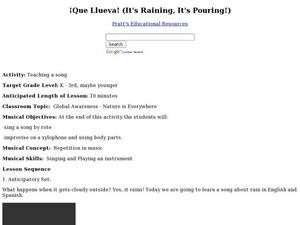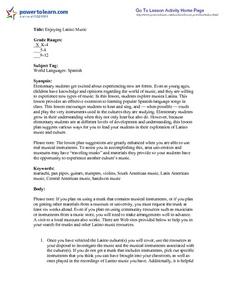Curated OER
Spanish Body Parts and Vowels
Play Simon Says with your young Spanish learners! First teach them body parts in Spanish, and then get them up and moving with this short activity!
Curated OER
Spanish Body Parts
Learners practice the Spanish vocabulary for greetings, classroom commands and body parts. They demonstrate the use of Spanish vocabulary to identify colors.
Curated OER
Spanish Body Parts
Pupils learn Spanish vocabulary with visuals and hands-on activities.
Curated OER
Spanish Head, Shoulders, Knees, and Toes
Young scholars sing the song Head, Shoulders, Knees and Toes using the spanish words for the parts of the body. They practice saying the words before singing the song and try going faster each time the sing the song.
Curated OER
Do the Hokey Pokey in Many Languages
Students replace the body part words in the tune The Hokey Pokey with the same body part words in other languages. They learn the vocabulary more readily because of the connection to music.
Curated OER
Spanish - "Head, Shoulders, Knees, and Toes"
Students begin lesson by singing, "Head, Shoulders, Knees, and Toes" in English as a class. They then are introduced to the song in Spanish using one body part at a time and repeat the song with the teacher singing slowly. Next, they...
Curated OER
Que Llueva! It's Raining, It's Pouring!
Students learn to sing a song in another language. In this music instructional activity, students learn a song about rain in English and Spanish. Students listen to the song Que Llueva in Spanish and It's Raining, It's...
Curated OER
El Joki Poki (The Hokey Pokey)
First graders sing and dance the Hokey Pokey bilingually. They read and sing the Spanish words for prepositions and act them out as they sing and act out the motions to the song, "El Joki Poki" (The Hokey Pokey).
Curated OER
Enjoying Latino Music
Students view different musical instruments from around Latino world, predict what sounds instruments will make based on their appearance, listen to and evaluate music from different Latino genres orally or in writing, and make...
Curated OER
Feliz Navidad: A Mexican Christmas Unit
Students participate in interdisciplinary activities related to a Mexican Christmas celebration. They inquire about Christmas in Mexico through story, Spanish language, song, art, and dance.
Curated OER
Ojal??
Students listen to the song and fill in the lyrics on a worksheet. They translate the meaning of the song into English. They concentrate on the correct verb tenses in the song. This activity is used as a warm up for a verb Spanish...
Curated OER
Dancing and Singing Through the Bill of Rights
Students study the Bill of Rights. In this Bill of Rights lesson, students read and analyze the Bill of Rights before performing The Amendment Song, and a dance associated with the concepts. They work in small groups using a Frayer...
Curated OER
How Hard Is Your Heart Working?
Students observe the differences in their pulse from when they are sitting to when they have been doing the "Hokey-Pokey." In this heart health instructional activity, students take and record their pulse after they have been doing...
Curated OER
Environment: John Muir Day
Students observe John Muir Day by visiting Websites containing fact sheets, excepted writings, as well as songs, pictures, and educational sources. They use April 21 as a day to reflect on Muir's accomplishment and environmental legacy....
Curated OER
Lesson Connections
Second graders listen to, analyze, and describe music. They are assessed as to whether they are distinguishing between A and B sections through different types of music. Students imitate echo, motive, phrase and AB or ABA. Finally,...
















